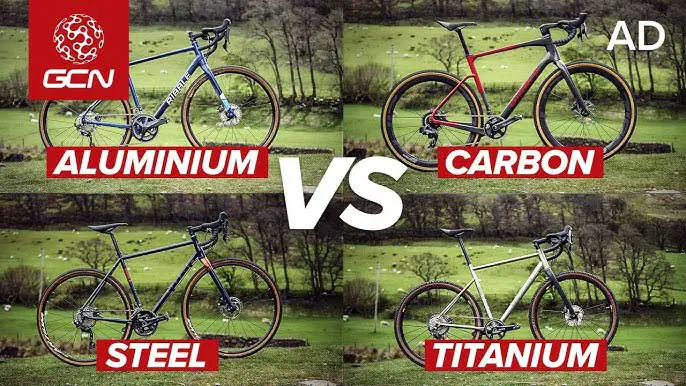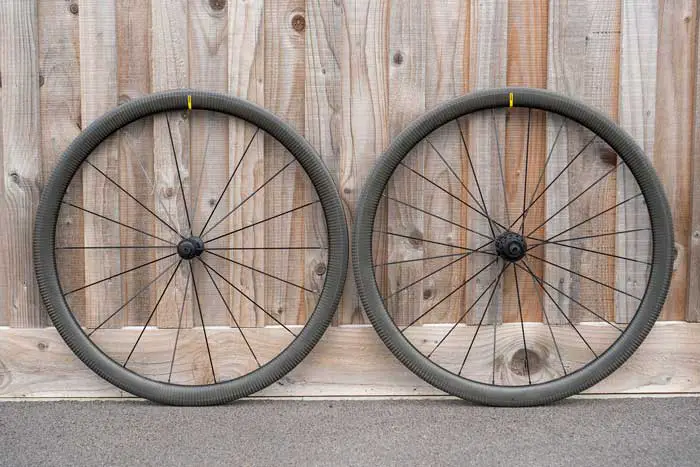No matter how much-advanced transports are present, the importance and popularity of cycling will never be less. However, if you enjoy the full benefits of cycling, then you are required to choose the best. In this term, the cycle materials matter a lot as they impact the riding performance.
Due to the introduction of the latest technology, various types of materials are used in the bike-making process. Carbon and aluminum are the most used elements for making the bike frame. It is confusing which component will be right for your next bike. So check out the comparison article on carbon vs aluminum mountain bikes that helps you in deciding.

Carbon Fiber VS Aluminum Bike Frame
Among athletes, mountain bikes are a favored type of bike. They are built of sturdy material and feature multiple gears and ribbed tires that make them stronger than other types. Though carbon and aluminum both are widely used in mountain bikes, each of them has its own benefits and disadvantages. For better understanding, find out the difference between carbon and aluminum bike frames
- Weight
Carbon fiber bikes have lighter frames than aluminum frames. In fact, most riders choose carbon bikes for their lightweight. Because a lighter mountain bike frame allows you to climb faster. You can also accelerate and move easily. Many manufacturers offer 15 lb weight for complete carbon road bikes. This is the minimum weight recommendation of the UCI rules. However, 20 lb carbon mountain bikes are commonly available in the market.
On the other hand, aluminum bikes weigh around 18 pounds on average which is a little heavier than carbon bikes. Usually, aluminum bikes are around 1 pound heavier than carbon frames.
The carbon fiber bike frames have less weight because the material is less dense. But the strength is incredibly high compared to the weight ratio. Furthermore, the grades of the carbon impact the weight. Low-quality carbon bike frames contain resin and other fillers that increase the weight. Sometimes, low-quality carbon bikes are weightier than high-end aluminum frames.
Since weight plays a major role in mountain riding, lightweight carbon fiber frames are preferable. At the same time, you need to beware of low-end components because they may perform worse and end up costing the same.
- Riding Performance
You’ll experience a smooth, comfortable ride on a carbon bike frame rather than an aluminum frame. Because the carbon fibers better absorb shocks and dampen vibrations while riding. Every rider wants a rigid frame but does not want to waste energy by flexing it. So the carbon fibers make a more comfortable ride while biking on the rough roads.
Aluminum frames relatively offer less smooth and refined rides than carbon frames. The big reason is the soft characteristics of aluminum. The manufacturer makes pretty thick frame tubes that make it strong. But it feels harsh to ride stiff bike frames because the vibration and shocks transfer through the frame to your body. This is why aluminum bikes are not ideal for off-road riding.
- Durability
As carbon bikes are lightweight, many have confusion about is carbon bike frame durable. Let me tell you that carbon fiber bike frame durability is much higher. But the durability of the aluminum frames is also incredibly durable and reliable.
The aluminum bike frames can withstand a harder impact force without cracking or breaking. The bike may have some minor dent; still, it is rideable. If you are riding on such a route where crashing is common, aluminum is the better option. Many cyclists choose this frame for mountain biking.
For normal riding conditions, carbon fiber frames are suitable. Because this material is fairly fragile and the frame can break or crake easily.
- Pricing
The price range of aluminum is much lower than carbon fiber bikes. In fact, aluminum is cheaper than other materials like steel and titanium. You will be amazed that this type of bike costs half of the carbon frames.
Because of lower-priced, the production of aluminum frames is massive in the factory. Although the process is automated and requires fewer specialized tools. The raw material of aluminum is also cheap. For the same reason, these bikes are a more popular choice for many cycling events like mountain biking.
On the contrary, carbon frames are expensive. Because the making process is labor-intensive work. It requires man-hours rather than a machine. It increases the labor cost. Moreover, carbon is a critical material and needs the skill to deal with. Making the cycle frame requires specialized molds and tools that enhance the cost.
However, some manufacturers try to meet a lower price point. As a result, they use lower grade carbon and more epoxy fillers. But they are heavier and not as effective as aluminum. If you want some reasonable option, then you must consider aluminum bikes rather than low-end carbon bikes.

- Stiffness
Carbon frames provide a higher degree of stiffness. Though these frames tend to be light and sometimes brittle, they are still sufficiently rigid. It makes it easy to steer in the right direction. On the other hand, aluminum bike frames are well-known for the stiffest frames. It makes tough and compact bike frames. So you will have confidence while riding the bike on rough terrain. It is ideal for mountain riding.
- Resistance to rust
Carbon material has a high resistance to rust. Since carbon doesn’t have metal components, they have better resistance to water and rust. This component has unique characteristics and is molded with a special compound. If you decide to ride your mountain bike in damp regions, then the carbon frame is the right choice for you. You can use it without the feature of rust or water damage.
Aluminum has metal compounds, so these bikes are very prone to rust and water damage. Though the rust damage on these frames is not instant like solid metal. They get rusted after a certain amount of exposure to water.
- Repairing cost
In terms of repairing cost or ease of repair, carbon fiber frames are not the best choice. It is proven that these frames are quite difficult to repair and cost more than usual. The rarity of carbon frames makes it quite challenging to repair them. Sometimes, you may need to replace the whole frame due to small damage in the frame. Even many find it challenging to find the replacing parts.
Since the aluminum frames are mostly used for bikes, you can easily repair these frames. It is much easier to fix than carbon frames. Moreover, you will easily find the replacement parts which costs very low. The parts are available in almost any repair shop.
Pros & Cons of Carbon Frame:
| PROS: Carbon Frame | CONS: Carbon Frame |
| Lighter weight because the material is less dense | Expensive price |
| More comfortable and smooth to ride | The frame can crake with light force |
| Last longer if you ride on the fine roads. | Harder to carry luggage |
| No corrosion and suitable to use in damp regions. | |
| Higher-end bikes are mostly used carbon material | |
| More efficient to padel and accelerating. |
Pros & Cons of Aluminum Frame:
| PROS: Aluminum Frame | CONS: Aluminum Frame |
| Cheaper price | Heavyweight |
| More durable and withstand high force. | Harsher to ride as less shock-absorbent feature |
| Higher stiffness and less brittle. | The frames easily get rust and water damage. |
| Can be repaired easily and they cost lower. | |
| Safer to use on off-road cycling. | |
| Easily carry luggage using a frame. |

Carbon Vs Aluminum Road Bike
When comparing carbon fiber and aluminum road bikes, there are several key differences to consider, each material offering unique benefits and drawbacks based on your cycling needs, preferences, and budget. Here’s a comparison:
Weight
- Carbon Fiber: Generally lighter than aluminum, contributing to faster acceleration and easier handling, especially important for racing or climbing.
- Aluminum: Slightly heavier, which can affect acceleration and climbing, but the difference might be negligible for many riders.
Stiffness and Ride Quality
- Carbon Fiber: Offers the ability to be engineered for specific stiffness without compromising ride quality. This means a carbon bike can be both stiff (for efficiency) and compliant (for comfort) where needed.
- Aluminum: Traditionally, aluminum frames are stiffer, which can lead to a harsher ride. However, advances in aluminum technology and design have allowed for improved ride quality.
Durability and Lifespan
- Carbon Fiber: Very strong and doesn’t fatigue in the traditional sense like metals do. However, it’s more susceptible to damage from direct impact and can fail catastrophically if damaged severely.
- Aluminum: Durable and has a longer fatigue life than carbon. It can dent without failing, offering a more predictable failure mode. However, once it begins to fatigue, its structural integrity decreases.
Cost
- Carbon Fiber: More expensive due to the labor-intensive manufacturing process and the cost of materials. High-end carbon frames offer the pinnacle of performance but at a premium price.
- Aluminum: More cost-effective, making it a popular choice for entry-level and mid-range bikes. Advances in aluminum technology have significantly improved performance, narrowing the gap with carbon.
Maintenance and Repair
- Carbon Fiber: Repairable, but it can be costly and requires specialized skills. Not all types of damage can be repaired, and sometimes the extent of internal damage can be hard to assess.
- Aluminum: Easier and less expensive to repair than carbon. While aluminum frames can be more tolerant to minor dings and scratches, severe damage will require replacement.
Vibration Absorption
- Carbon Fiber: Superior vibration damping properties, which can lead to a smoother ride over rough surfaces. This can reduce rider fatigue over long distances.
- Aluminum: Less effective at dampening vibrations compared to carbon, though modern aluminum frames often incorporate design features or materials to improve comfort.
Environmental Impact
- Carbon Fiber: Production and disposal pose greater environmental challenges due to the energy-intensive manufacturing process and difficulty in recycling carbon fiber materials.
- Aluminum: More environmentally friendly in terms of production and recycling. Aluminum is widely recycled and requires less energy to produce than carbon fiber.
Frequently Asked Questions Carbon Vs Aluminum Mountain Bike
Are carbon bikes stronger than aluminum?
Carbon bikes are strong, but sometimes they are proven brittle on rough terrain. In the case of aluminum bikes, they are much stronger than carbon bikes. They don’t crack easily.
What is better carbon or aluminum?
It depends on your needs. Finding the better option depends on how you will use it. If you are planning on riding the bike off-road, then aluminum will be the best option. Or if you are going to ride on the smooth road, then carbon is the top preference.
Are carbon bikes faster than aluminum?
Since carbon bikes are light, you can easily padel on the road. You can move easily and go in the right direction. Moreover, it better absorbs shocks that let you ride without any difficulty.
Why are carbon wheels better than aluminum?
Carbon wheels are lighter than aluminum wheels. Being lightweight, carbon wheels provide better climbing ability. You will have better speed compared to the aluminum wheels.

Final Verdict
After reading this comparison article, you must be aware of the advantages and disadvantages of carbon and aluminum mountain bikes. Both of them have riding benefits. The carbon bikes are easy to ride, provide ample speed, are resistant to rust, and are a comfortable experience. But they are expensive. You may be thinking, is a carbon frame worth it? Since the quality of the bike frame is the most significant consideration, you should give priority to quality. According to the fact, the price is justified.
The aluminum mountain bikes will be a great option if you want some cost-efficient product. The performance of these bikes is a little bit harsh but not as bad as low-end carbon bikes. Furthermore, they are durable and last for longer. The repair cost is also cheaper. So you should consider aluminum bikes if you don’t want to break your wallet.

Hels On Wheels aka Helen Dainty is a full-time global hobo cycling around the world on a budget of AU$ 100 per week. She left the UK in 2004 and has been living out of a backpack ever since.




Leave a Reply